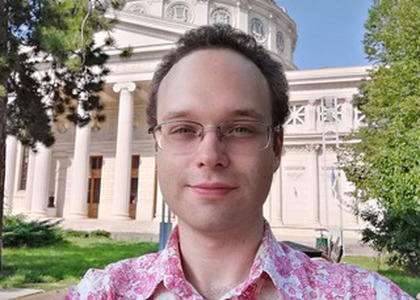> [Archived] Interviews

Interview with Vlad Ghinea, winner of the Mihail Jora Competition - music criticism
Vlad Ghinea completed his bachelor's and master's studies at the National University of Music in Bucharest, under the supervision of Prof. Valentina Sandu-Dediu, PhD, specialising in musicology, and is currently a PhD student at the same institution, researching musicological volumes published by Musical Publishing House during the communist period.
The texts of the winners of the "Mihail Jora" Competition, music criticism section are available on our website, in the "Reviews" section.
Vlad Ghinea, you are the first prize winner of the Musicrit Music Criticism Contest. What made you decide to take part in this competition?
Usually when I write a music review I think of it as a kind of mini essay. For example, when I attend a concert I get a general idea about the concert and I support that idea by arguing with the concert I heard. When I saw the announcement for this competition, it seemed like a great opportunity to practice three mini-essays through music reviews. Through the three essays I wrote, I also pursued the passions I have in this field. Firstly, contemporary music; attending Adriana Toacsen's recital with encores that brought together several miniatures of contemporary piano music. On the other hand, reviewing a book on pop and rock music as I listen to a lot of music belonging to these styles. Incidentally, my musical beginnings are also in this area, rather mainstream, not necessarily classical music. Last but not least, the area of opera, which I appreciate very much. Tchaikovsky is one of my favourite composers, so it was a real pleasure to write a text about 'Yevgeny Onegin'.
What is the role of a music criticism competition, in your opinion?
I think that such a competition is welcome, especially because, at least for the time being in Romania, there are very few competitions of this kind, and this edition of the "Mihail Jora" Competition really supports young musicologists, who have the chance to write various materials and have the chance to publish these materials. It is indeed a very important aspect to be present in cultural life.
What does the award mean to you?
It is a real honour, given the name of the competition - "Mihail Jora", a very important personality for Romanian cultural life, composer and music critic alike. I am truly honoured to receive this distinction.
I know that you are also passionate about composition, and you even participate in competitions with your work. How do you combine musicology and composition and what other passions do you have?
It's quite an interesting story. Since high school I had such compositional interests, but once I entered university, in the musicology department, I can say that the two sides have intertwined. Both musicology influenced composition and composition influenced my way of doing musicology. During college and through composition, but also through musicology, I rediscovered the pleasure of playing the guitar, and the instrumentalist's work is reflected especially in this side of composition.
I like literature very much. In addition to the obvious connection with my work as a musicologist, my passion for literature is also reflected in my composition. This is especially the case when talking about a recent composition of mine, which was influenced by George Orwell's 1984. I believe that literature can have positive effects on several musical sides.
What do you think is the role of critics in the music world?
I think that nowadays the music critic can be a real culturalinfluencer, in the true sense of the word, because he has gone through a serious, consistent school, so he has a background that justifies his opinions and, after all, nowadays, we need to attract the public to good music, quality music. I think a music critic can play a key role in that.
Translated by Ramona Ana-Maria Ionescu,
University of Bucharest, Faculty of Foreign Languages and Literatures, MTTLC, year I
Corrected by Silvia Petrescu














